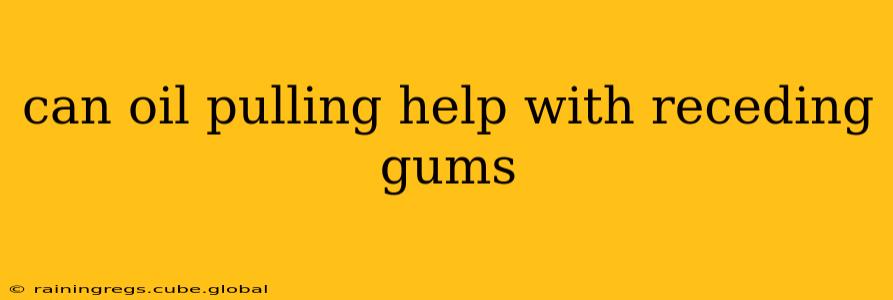Receding gums, a condition where your gums pull back from your teeth, exposing the roots, is a common dental concern. While oil pulling has gained popularity as a natural remedy for various oral health issues, its effectiveness in treating receding gums remains a topic of debate. This article explores the potential benefits and limitations of oil pulling for receding gums, answering common questions surrounding this practice.
What is Oil Pulling?
Oil pulling involves swishing a tablespoon of oil, typically coconut or sesame oil, in your mouth for 10-20 minutes before spitting it out. Proponents claim it removes bacteria, toxins, and other harmful substances from the mouth, improving oral hygiene and potentially benefiting conditions like gum disease. However, it's crucial to understand that scientific evidence supporting these claims is limited.
Can Oil Pulling Reverse Receding Gums?
While oil pulling may offer some benefits for oral health, it's unlikely to reverse receding gums on its own. Receding gums are often a symptom of underlying issues like gum disease (gingivitis or periodontitis), aggressive brushing, genetics, or hormonal changes. These conditions require professional dental care for effective treatment.
Does Oil Pulling Help Prevent Gum Recession?
Oil pulling might contribute to better oral hygiene by reducing bacteria in the mouth. A cleaner mouth can potentially reduce the risk of gum disease, a major contributor to gum recession. However, it's not a substitute for regular brushing, flossing, and professional dental cleanings. These remain essential for preventing gum recession.
What are the Benefits of Oil Pulling for Oral Health?
While the impact on receding gums is questionable, oil pulling may offer other benefits:
- Improved Oral Hygiene: By reducing bacterial load, it can contribute to fresher breath and potentially a decrease in plaque buildup.
- Reduced Inflammation: Some individuals report a reduction in mouth inflammation, which could indirectly benefit gum health. However, this needs further research.
Is Oil Pulling Safe?
Oil pulling is generally considered safe when practiced correctly. However, some precautions are necessary:
- Avoid swallowing the oil: Spit it out after the allotted time as it will contain bacteria and other impurities.
- Choose the right oil: Coconut and sesame oils are popular choices.
- Monitor for any allergic reactions: Discontinue use if you experience any adverse reactions.
What are the Best Treatments for Receding Gums?
Receding gums require professional intervention. Effective treatments typically involve:
- Scaling and root planing: A deep cleaning procedure to remove plaque and tartar from below the gum line.
- Antibiotics: To combat gum infections.
- Gum grafting: A surgical procedure to replace lost gum tissue.
- Improved oral hygiene: Consistent and proper brushing and flossing are crucial for preventing further recession.
Can I Use Oil Pulling Alongside Professional Treatment?
While oil pulling may complement professional dental treatment, it shouldn't replace it. Discuss the use of oil pulling with your dentist before incorporating it into your oral hygiene routine, particularly if you already have receding gums. They can advise you on the best course of action for your specific needs.
Conclusion:
Oil pulling may offer some ancillary benefits for oral health, potentially contributing to improved hygiene and reduced inflammation. However, it's not a proven treatment for receding gums. If you're experiencing gum recession, it's crucial to seek professional dental care for proper diagnosis and treatment. Don't rely on oil pulling alone to address this condition. Consistent professional dental care combined with diligent home oral hygiene practices, including brushing, flossing, and regular checkups, is the key to maintaining healthy gums and preventing gum recession.
